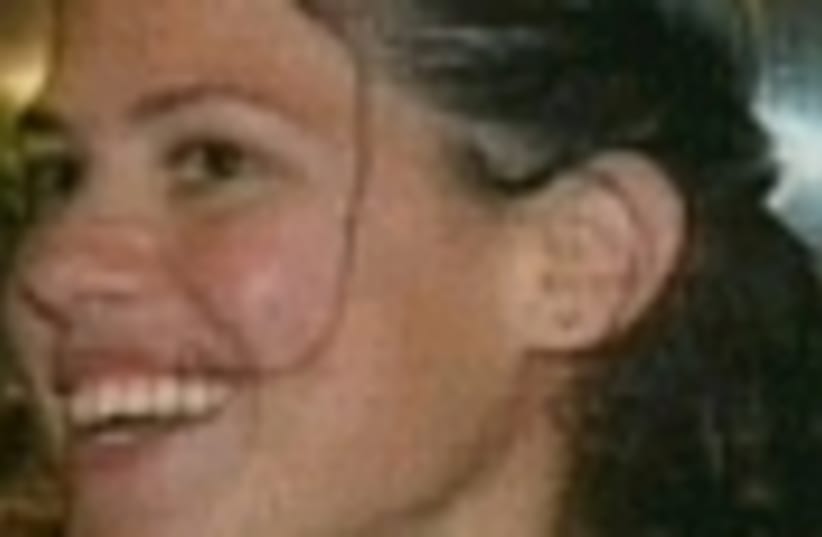Standing by his wife's shroud-covered corpse, Yisrael Adler sang the same melody he had sung to her at their wedding only three months earlier.
Matat Rosenfeld Adler, 21, and her cousin Kineret Mandel, 23, were among the three victims of a terrorist attack at the hitchhiking post at the Gush Etzion junction on Sunday.
Friends since childhood, the two were buried side-by-side Monday at the Har Hamenuhot cemetery in Jerusalem only hours before the start of Succot.
Hundreds of mourners joined Yisrael in singing to Matat before the burial.
Yisrael told the mourners that Matat had not wanted him to sing at their wedding.
"You were so modest you didn't want people looking at you to see if you were laughing or crying. Now it doesn't matter. Now you're looking at us," he said.
Opponents of disengagement, Matat and Kineret, who each had four siblings, had spent the summer volunteering to help the Gaza Strip settlers and were evacuated with them, their uncle Yehoshua Rosenfeld told The Jerusalem Post.
Kineret had been in Neveh Dekalim, while Matat was in Netzarim, where she had also served as an officer in the Intelligence Corps Matat was arrested once while trying to enter Netzarim, but was released.
This fall she was starting to study law and dreamed of becoming a judge, because she wanted to fix the injustice in the legal system, her uncle said, adding that justice had always been important to her.
On Sunday she was returning from visiting her husband, who was serving in the Armored Corps in the Golan Heights. She had met up with Kineret and was looking for a ride for the last leg of the trip to Carmel, where both lived.
A neighbor from Carmel passed, but didn't have room in the car. Minutes later they were shot by a terrorist.
Rosenfeld said that upon hearing his nieces were involved in the attack, he and his sister, Kineret's mother, jumped into a car, heading to a hospital in Jerusalem where they assumed the two were taken. Along the way, they learned that there was no need to proceed, because they were dead.
Matat's father Naftali noted in his eulogy that the two women's grandparents were Holocaust survivors who believed the State of Israel would prevent the further sacrifice of Jews.
He asked the two to tell their grandfather in heaven that they and the family had continued in their tradition.
"Grandfather Eli, we have not moved a centimeter from your path. Here are two examples. We built a tradition for them and we defended it with our lives. I did my part, why didn't others do their part. Why didn't others defend you," he said.
Matat was the type of officer on whose behalf soldiers would have gone through "fire and water," Naftali said.
Almost whispering, he said, he would miss the way she loved looking at the sunsets out the window of her childhood home in Beit Horon.
"You will no longer say to me, Abba come quickly, take a picture, there is a sunset," he said. "More than anything, we will miss your smile."
Naftali's sister Rivka, Kineret's mother, said that the daughter she lost, her eldest, was her best friend.
"You were always thinking of others and worrying about us and remembering our birthdays. When you were home, I knew there was someone who I could depend on." She and her husband were always in awe that they had such a wonderful daughter.
"You will always be part of us. We are happy at least that you are gong to place that is all good and from there help us to deal with and to understand everything that has happened to us in the last few years. My Kineret, I do not believe that you are not here," she said.
The lives of these two young women revolved around the rabbis, she said. In their name, she asked them to unite and to unite the nation.
One of Kineret's younger sisters said that she had always waited for Kineret to come back. "Now I will only see you in the pictures that we have of you where you are always smiling. Please pray that there will be no more terror attacks and that we return to Gush Katif."
Another sibling recalled how deep Kineret's faith was and how important prayer was to her. On Yom Kippur she had gone to the Cave of the Patriarchs in Hebron to pray. "I didn't know where your strength came from," she said. "We will be strong because that is what you would say if you were here today."
At her grave, one of her sisters placed a photograph of her. Her brother knelt and kissed the dirt before walking away.
The third victim, Oz Ben-Meir, 15, of Maon, was buried in the Sussiya cemetery. The second of six children, he excelled in sports and was in the ninth grade at the Bnei Akiva yeshiva in Dimona.
| More about: | Israel, Cave of the Patriarchs, Neve Dekalim, Golan Heights |
